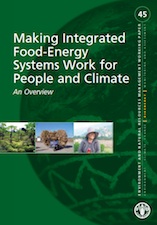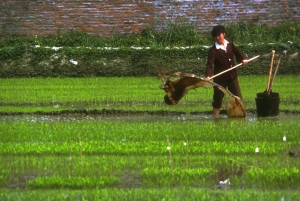 According to a new report, “Making Integrated Food-Energy Systems (IFES) Work for People and Climate – An Overview,” the simultaneous production of food and fuel by farmers can help to reduce poverty in countries such as Africa, Asia and Latin America. This according to FAO who published the report this week.
According to a new report, “Making Integrated Food-Energy Systems (IFES) Work for People and Climate – An Overview,” the simultaneous production of food and fuel by farmers can help to reduce poverty in countries such as Africa, Asia and Latin America. This according to FAO who published the report this week.
“Farming systems that combine food and energy crops present numerous benefits to poor rural communities,” said Alexander Müller, FAO Assistant Director-General for Natural Resources. “For example, poor farmers can use leftovers from rice crops to produce bioenergy, or in an agroforestry system can use debris of trees used to grow crops like fruits, coconuts or coffee beans for cooking.”
Müller noted that other types of food and energy systems use byproducts from livestock or biogas production and with this type of integrated systems, farmers can save money – they don’t have to buy expensive fossil fuel or chemical fertilizers. Rather, than can use the slurry from biogas production, a more sustainable, less costly alternative.
 “They can then use the savings to buy necessary inputs to increase agricultural productivity, such as seeds adapted to changing climatic conditions — an important factor given that a significant increase in food production in the next decades will have to be carried out under conditions of climate change. All this increases their resilience, hence their capacity to adapt to climate change,” said Müller.
“They can then use the savings to buy necessary inputs to increase agricultural productivity, such as seeds adapted to changing climatic conditions — an important factor given that a significant increase in food production in the next decades will have to be carried out under conditions of climate change. All this increases their resilience, hence their capacity to adapt to climate change,” said Müller.
IFES are also beneficial to women as they can eliminate the need to leave their crops to go in search of firewood. In addition, the report concludes that IFES farming can help to mitigate climate change, especially emissions stemming from land use change, because there is less chance land will need to be converted.
In conclusion, Olivier Dubois, an FAO energy expert said, “Promoting the advantages of IFES and improving the policy and institutional environment for such systems should become a priority. FAO is well placed to coordinate these efforts by providing knowledge and technical support for IFES implementation.”

